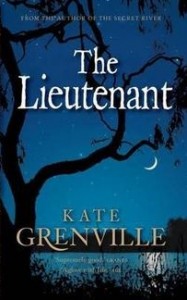What I’m Reading: “The Lieutentant” by Kate Grenville
 You may have noticed that I read a lot of speculative fiction—which is partly because I like it and partly because it’s something of an occupational hazard when you’re a speculative fiction author oneself: there’s the need to keep up with what’s new and with all the award lists. And then there are the interviews with other SFF writers: for me it’s kind of a point of honour to actually read the books before I start asking questions. A little old fashioned perhaps, but there you have it … 😉
You may have noticed that I read a lot of speculative fiction—which is partly because I like it and partly because it’s something of an occupational hazard when you’re a speculative fiction author oneself: there’s the need to keep up with what’s new and with all the award lists. And then there are the interviews with other SFF writers: for me it’s kind of a point of honour to actually read the books before I start asking questions. A little old fashioned perhaps, but there you have it … 😉
But although I may primarily write SFF, it’s not all that I enjoy reading. I read widely, but I particularly like historical novels, as well as historical non fiction, and I also read a fair bit of contemporary realism as well. Last year I read Kate Grenville’s The Idea of Perfection, which I would put in the “contemporary realism” camp. I enjoyed it very much—and was also very interested by a radio discussion of The Lieutenant that I heard a while back, so was pleased to acquire a copy of that book, too.
The Lieutenant is historical fiction and based on the true story of William Dawes, a soldier, astronomer, mathematician and linguist who was part of the First Fleet expedition to settle Australia, and founded the first astronomical observatory as part of the Sydney settlement. And according to the Author’s Note at the rear of the book: “The record he left of the language of the indigenous people of the Sydney area is the most extensive we have.”
Getting round to reading The Lieutenant has taken some time, and so far I am only in the early chapters. But I am enjoying them immensely, partly because the character of Daniel Rooke, based on Dawes, is so interesting, and partly because Grenville’s writing is such a joy to read—clear compelling prose, beautifully expressed, with wonderful characterization. I am a little wary of how the story will develop, not because of any doubts about Kate Grenville’s writing or storytelling, but because I know that the history of interaction between the British settlers and the indigenous Aboriginals was generally tragic (mainly for the Aboriginals.) But based on my experience with The Idea of Perfection and what I have read so far, I am pretty certain that I’m going to continue enjoying the book.







